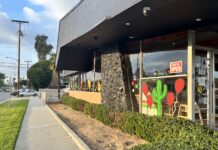 The last event in the “Speak Out!” series, “The Symposium on Policing and Protest in the UC System & Beyond – Part 2” took place at the University Theatre on Friday, May 25. Each of the event’s three panels addressed police intervention and police presence in response to student protests throughout the UC system. An introductory short video titled “Who Does the Law Protect?” covered the main topics of Friday’s agenda, which revolved around the Irvine 11, other protests in the UC system and a talk by Angela Davis.
The last event in the “Speak Out!” series, “The Symposium on Policing and Protest in the UC System & Beyond – Part 2” took place at the University Theatre on Friday, May 25. Each of the event’s three panels addressed police intervention and police presence in response to student protests throughout the UC system. An introductory short video titled “Who Does the Law Protect?” covered the main topics of Friday’s agenda, which revolved around the Irvine 11, other protests in the UC system and a talk by Angela Davis.
“At UCR, dissent is implicitly discouraged and explicitly criminalized. An atmosphere of fear is produced by conservative coordinated efforts to intimidate,” said Associate Professor and Chair of the Department of the History of Art Patricia Morton. Morton stated that student protesters are often reprimanded and repressed while attempting to enact political change through demonstrations. Morton referred to the aftermath of the Jan. 19 protest at UCR where student activists received letters from the office of student affairs, warning that they had infringed on university policy. UCR’s previously released “Guidelines for Protest” received enormous condemnation, as seen in the petition signed by nearly 800 individuals.
UCR biochemistry major Shaheen Nasser and alumnus Taher Herzallah were two of the 11 individuals arrested after interrupting a speech made by Israeli Ambassador Michael Oren at UC Irvine in 2010. Nasser expressed disbelief about his arrest and criminalization for his attempts to express political criticism against the Israeli government. “It’s directed at all forms of student political activism who want to change the system,” stated Nasser, who felt that the punishment had been overly critical of his actions and felt that he was persecuted on the grounds of his cultural identity and not for the political message he was attempting to deliver. At the same time, Herzallah felt an institutional bias within bureaucratic alliances that developed over the misdemeanor charges from Tony Rackauckas, the Orange County district attorney who he claimed used militarized means of retrieving personal data.
“The climate throughout that day was…thick with police presence and the pageantry of police intimidation, and amounted to a massive show of force against the students, faculty and staff,” said Professor of Ethnic Studies Dylan Rodriguez, who referred to the Jan. 19 protest at UCR.
In reference to the 1998 murder of Tyisha Miller, Rodriguez specified that police brutality has been used as a “generic” reference, therefore minimizing the severity of sanctioned police practices. Rodriguez continued to elaborate on the idea that the generalized acceptance of police presence within public universities has resulted in the criminalization and suspicious profiling of minorities. Lastly, Rodriguez emphasized that the continued deployment of law enforcement on non-violent protests is not an “isolated” issue, but encompasses a much broader representation of police violence in society.
The first public forum period remained brief with commentary on understanding police protocol, the need for greater student political education and developing more open dialogue in addressing police violence through preventative means. The second round of panelists was then introduced by CHASS Dean Stephen Cullenberg.
Panelist Gina Dent, an associate professor of feminist studies at UC Santa Cruz, retraced her connections to the suicide of Chancellor Denise Denton and association with Angela Davis. In response to a 2005 tent encampment on campus, riot police were deployed from UC Berkeley to Santa Cruz, which led to enormous outcries by faculty members, and garnered over 200 signatures in protest. Dent portrayed Denton as having a “complicated position” in encouraging the creation of cultural programs, yet advocated open student activism. Dent referred to this storyline to convey the overall perspectives that were changed as a result of Denton’s suicide and the deployment of armored law enforcement.
In her following story, Dent illustrated a trip that she took with Angela Davis to Columbia in order give a week-long seminar on feminism. As they traveled to Bogota, masked assailants bombed the back of the room in which they resided, but only with the intention of welcoming Denton and Davis. The assailants celebrated their visit with roses, but the hostile nature of the bombing conflicted with their intended non-violent message.
“Our job as police is to keep the peace and ensure the safety of people that are attending these meetings,” UCSF’s chief of police stated in a YouTube video, which was shown to open the last panel. In the video, Occupy Cal protesters at the November 2011 protest were shown standing face to face with the police. As if their assembly was considered threatening, police officers responded by repeatedly pummeling students with clubs. Another clip depicted the pepper spraying of UC Davis protesters during the same month.
While police brutality has been rampant on UC campuses during Occupy protests, it has also been a concern elsewhere. The third panel of speakers expanded on the presence of police terrorism in other areas of the world but primarily shed light on alternatives to secure the welfare of communities and campuses.
Associate Professor of English Vorris Nunley noted why it is necessary to find alternatives to police intervention. He posed examples of the injustice perpetuated by policing such as the case of Marian Williams, an African American woman who, upon an encounter with her violent husband, shot a gun through the roof of her house to protect herself. Believing that she had been protected by the Stand-Your-Ground law, she nonetheless received a 20-year prison sentence despite causing no harm or injuries to her husband. “Apparently, black women don’t have ground to stand on,” Nunley said. “If I’m discomforted, it’s because we need a change of rhetoric. It’s important that we have rhetoric because indeed, this is a struggle over rhetoric.”
Nunley stated that rather than using the euphemism “police brutality,” we must not hide what it is—police terrorism. In discussing alternatives to policing, Nunley suggested civilian policing review boards consisting of ministers, community organizers and others involved in public policy to sanction and hold police responsible. Other alternatives mentioned included community groups that protect and create safe spaces for women, which have served the masses across the country, and circle sentencing, a practice based on Aboriginal and Native American notions of justice. Circle sentencing involves a collective body of community members who allow the perpetrator and victim to speak and decide the sentence for the perpetrator. Such alternatives do not aim to impose punishment, but rather promote restorative justice in communities to which justice has been foreign.
UCR Alumna Brittnay Proctor, who had been a strong student activist on the campus during her undergraduate years, recalled the criminalization of her body without the presence of UCPD, but rather UC administrators. Along with fellow student activist Danielle Benjamin, Proctor addressed the African Black Coalition Conference in the Spring of 2010, where UC President Mark Yudof had been called to speak. Proctor and Benjamin stated that in the weeks prior to the conference, Yudof had openly policed and criminalized Palestinian students for expressing their political activism at UCI. Proctor and Benjamin openly denounced President Yudof’s course of action following the UCI 11 incident. UCR Chancellor Timothy White believed that Proctor and Benjamin “hijacked the confrence” by placing a spotlight on the Irvine 11, and later condemned the students for “derailing the conference with their political agendas.”
In the months that followed, Proctor felt that the narrative and language used made her out to be crazy, barring her from the community with which she identified. She mentioned friends and understanding members of the community who helped her surpass the backlash she experienced. “I learned the importance of balancing mental health in my activist efforts and the work itself. Deliberate self care and community care creates safer spaces,” Proctor insisted. “Energy should be invested to create safe spaces within and outside of the university, not based solely on the work needed to be done, but spaces that deal with mental health and community care.”
Angela Davis, who is a professor emerita of history of consciousness and feminist studies at UCSC and a nationally distinguished political activist was the last speaker of the panel. Drawing from her association with the Civil Rights Movement, Davis gave a snapshot of the history of protest, drawing a parallel between the past and present. Davis emphasized the instrumentality of protests on UC campuses in bringing a focus on issues affecting larger communities. Among the few historically significant developments in protests discussed, Davis narrated the targeting of UCSC student and activist Alette Kendrick for demonstrating at a student meeting with the UC Regents in 2006. Following her arrest by the Santa Cruz police, Kendrick faced a felony charge and three-year suspension from the university. In a landmark deal, the administrators dropped the charges, allowing Kendrick to finish her degree. Davis continued with a focus on the promise of police abolition. In South Africa a white policeman found guilty for killing the son and husband of a black South African woman faced the truth and reconciliation commission. When the woman was asked what she wanted to happen to the policeman, she said she wanted three things: to know where her husband was burned and killed to gather his ashes, for the man to spend time with her and become her son and for someone to lead her across the courtroom so that she could embrace him. Davis stated, “I conclude with this as a gesture of imagining ways of addressing the worst possible issues in an abolitionist context.”
The symposium was spearheaded by Assistant Professor of Media and Cultural Studies Setsu Shigematsu and co-sponsored by the Center for Ideas and Society, College of Humanities, Arts and Social Sciences, CHASS F1RST, the department of ethnic studies and the department of media and cultural studies.








